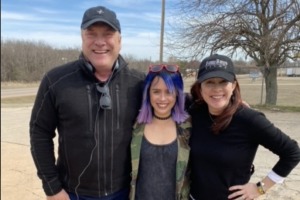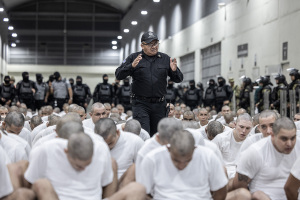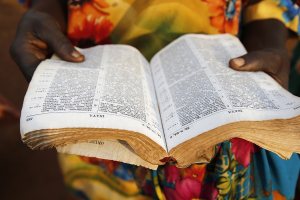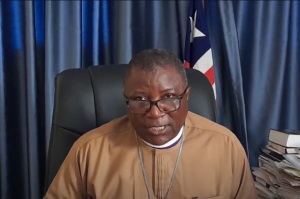Faith leaders are increasingly navigating mass trauma, a new media resource promises to help
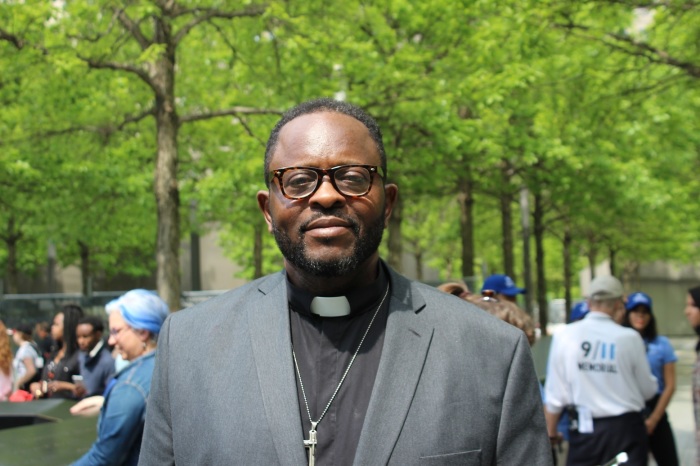
NEW YORK — Time and air seemed to freeze as Pastor Sam Saylor’s raspy voice, still palpable with pain, boomed through the room inside the 9/11 Memorial Museum.
“We are called to be, as healers, we are called into a ministry, to serve God and it’s not an easy task. It will give us high blood pressure. It will even kill us. It is a seat of service, not to be served,” he said with steely defiance.
“We have to be like Aaron. When Aaron wanted to go and cry about the loss of his sons he was told to stay in the temple. You have to hold the mantle up. You’ve got to hold the sense of hope up no matter how devastated and dark it gets,” he said.
“How do you go to a mother’s door who can’t move beyond the bloodstained steps because she can’t afford to go live somewhere else? You’ve got to tell her how you made it over. So every one of our testimonies, every one of our pieces tells about the face of God how even in the midst of the darkness His hand will reach in and keeps us stabilized sufficient enough just to get through the next day,” he continued. “That’s what we have to do. That’s how we heal. ... We have to become overcomers of this evil.”
Saylor is the senior pastor of the Gardner Memorial AME Zion Church of Springfield, Massachusetts. He is also the national vice president of the National Gun Victims Actions Council, a non-profit network of 14 million gun victims, survivors, the faith community and ordinary people.
Saylor’s son, 20-year-old Shane Oliver, was shot dead in a violent street encounter in 2012. Despite his steely resolve that faith leaders should stand and serve in the face of evil however, he also understands that those who heal must get healing when they need it too.
So on Friday, he joined a group of community and faith leaders at the museum who became first responders to mass trauma for a screening of clips from a new media resource recently released by Odyssey Impact called “Healing The Healers.” The series highlights the need for support for faith leaders who respond to mass trauma.
This mass trauma can be like the 9/11 terrorist attacks, the massacre at Sandy Hook Elementary School in Newtown, Connecticut, where Adam Lanza, 20, gunned down 28 people including himself and his mother, or ongoing gun-violence in urban communities like where Saylor’s son was killed.
The new “Healing The Healers” series is hosted by the Rev. Matthew Crebbin, a senior pastor at Newtown Congregational Church who was present in ministry at the time of the Sandy Hook Elementary School tragedy. It was also created in partnership with the Institute for Collective Trauma and Growth to help communities prepare for and navigate complex trauma, and foster support and recovery in the aftermath of violent incidents.
“One of the reasons we want to inform you about trauma is when communities are traumatized and people don’t understand trauma, then people start accepting behaviors and conditions as normal because they don’t recognize that this is as a result of people behaving due to trauma,” Crebbin said Friday.
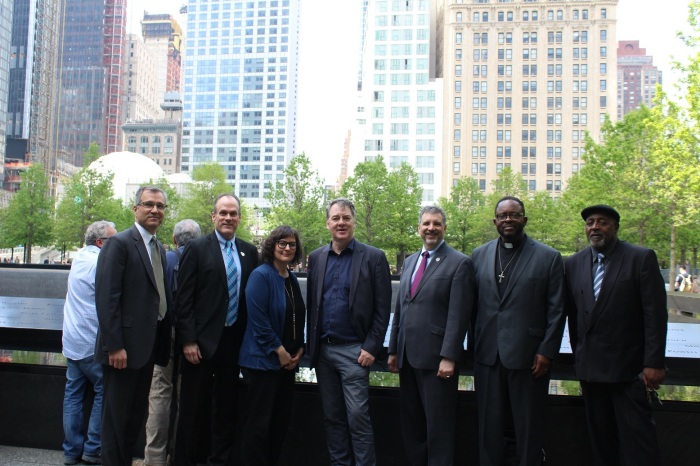
“Not being informed about trauma means we start accepting normal circumstances in our world as this is operational as opposed to saying actually when we’re traumatized it means our world doesn’t function properly and appropriately in all kinds of ways. So really the idea is by being mindful about trauma and helping to teach it, that’s why we have clergy being aware about trauma,” he explained.
“Clergy are serving in communities that are traumatized and don’t even know it. I look back at my ministry and say there are people that came into my doors that were traumatized and I didn’t recognize it. I didn’t know what was happening with them and I gave it to other things as opposed to recognizing now and saying ‘Oh my gosh. That was a traumatized person.’ I could have responded differently to them if I had understood that,” he said. “And that’s why it’s so important to inform those folks that are going to be engaging it because we tend to be transformative in all kinds of ways including how we deal with things in policy and political life.”
For Saylor, it wasn’t until the loss of his son that he truly began to understand the impact of trauma. He talked about how two weeks prior to Shane’s death he was at a rally with a group of Hispanic women who were protesting the violent murder of a young woman in their community.
“I didn’t know what to say to them. I had to get off the parade. I was speaking empty words into their lives and they weren’t responding,” he said explaining how vowed not to attend another vigil.
“Two weeks later, I led the parade of pain. I know what it was like to look into the lifeless body of a son and couldn’t answer, couldn’t get a life. I had to go on trusting in God,” he said. “I go around the country now and tell people …One lady in Baltimore said it was like an 80-pound gorilla got lifted off her chest just by sharing her story.”
Rev. Dr. Storm Swain, associate professor of pastoral care and theology director of Anglican studies at United Lutheran Seminary, called the new series “a real gift to those of us in theological education.”
“Trauma collects as time because we tend to store those traumatic memories in the amygdala in a sensory way and they don’t necessarily get processed through hippocampal pathways. But kairos time is like that as well, kairos time and sacred time. I think that for many that have been involved in disaster response and recovery, we go into that sacred time and we can go back there in a moment as well,” she said.
She also praised the relationships that allowed the stories highlighted in the series to be told in a way that did not “re-traumatize” those who told them.
“We can share those stories but the reality is, because it’s sacred, we don’t share those stories with everybody and I think there’s something about the gift and the healer in the Healers series with Odyssey is that Matt invites these conversations,” she explained, because he is a “safe person to talk to.”
“You have been there and walked through the valley of the shadow of death. That those relationships are either there already or invite that conversation in a way that is safe and invites us to witness rather than to be in a voyeuristic relationship,” she said. “More and more we are trying to bring disaster care into seminary life and … they have been using some of these videos.”
The Rev. Dr. Trace Haythorn, executive director and CEO of the Association for Clinical Pastoral Education explained that the practice of clinical gospel education began almost 100 years ago “because people thought they were leaving seminary schools ill-equipped to address the basic pastoral needs of people in the community.”
Trauma, he said, is something the students are increasingly beginning to face.
“It is common now for us to have students working in emergency rooms and trauma one centers so they are receiving this on a daily basis. And having to learning how to integrate that as they are trying to learn how to do the work at the same time. Now with the preponderance of disasters, whether natural or human or human accident, among all three, students have to develop a whole new set of skills and we work with folks across the whole spectrum of faith perspectives,” Haythorn said.
“So from the atheist chaplain which are two words I had not put together until recently, that’s now something we see more and more of, all the way to folks who are orthodox traditions whatever their faith group.
“Probably one of the most important groups that we have seen emerging in this work, there are folks for whom the idea of chaplaincy wasn’t a part of their faith tradition at all. Most recently that’s been in the Muslim community,” he added.
Nick Stuart, CEO of Odyssey Impact, called the series “one of the most important things we’ve ever done.”
“I’ve been at international film festivals all over the place, we have won awards … but this was really faith in action at its most important. One of the things we learned from Newtown, the film we made, is that the community turns to faith leaders for meaning, for understanding or even just to stand with them,” he said.
“Everyone assumes that faith leaders are supermen and women, that they’ve got the answers and somehow their strength or faith, means they’re almost immune to that pain and they’re not. We realized that really quickly and we thought, we could do something. Are our faith leaders being trained, are they being supported, and we thought we’ll put together some resources and we’ll help but also a campaign to urge denominations that they must put in place support for their ministers and pastors,” Stuart noted. “It’s their duty almost. You can’t just put trained ministers and then send them out without the training to deal with mass trauma. I’m hoping this will help.”
Kirsten Kelly, senior producer for Transform Films and Odyssey Impact, who worked on the series, said it was a “sacred journey.”
“It’s not something I expected in my filmmaking life and I think that working with Rev. Crebbin, really being along with him and trying to capture him and these conversations authentically and intimately as possible has been a challenge but also an important challenge to really wrap your arms around,” she said.
“I think through each of the episodes in the series as a whole, I think the greatest message that we as a society understand, [is] the isolation that often these faith leaders face in these traumas and tragedies,” Kelly said. “If we can strengthen the communities both within your small congregation, within your community at large, that that strength is what will be your support in the darker moments. No one can do it alone, especially when that healer or that pastor is being asked almost to sacrifice their own personal feelings, or journey of grief, in order to lead and help others. That can often be isolating.”
















